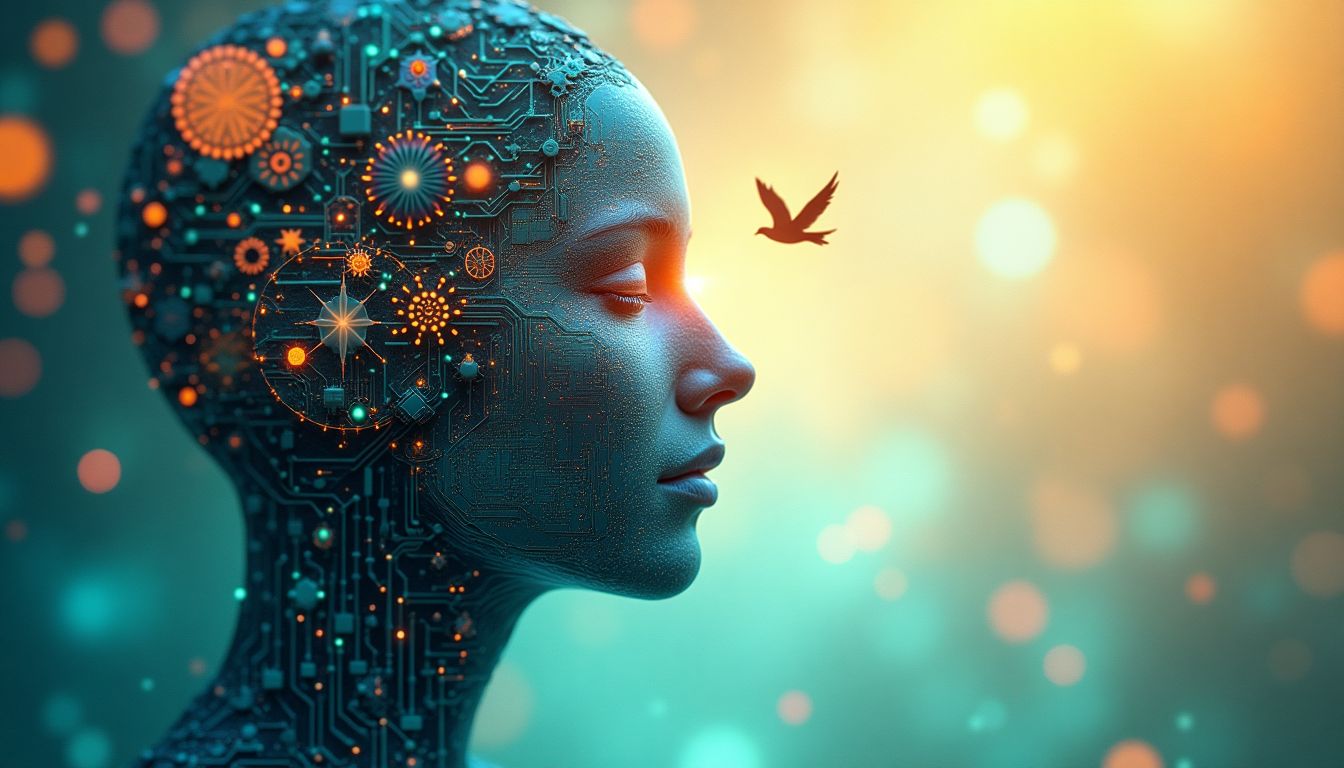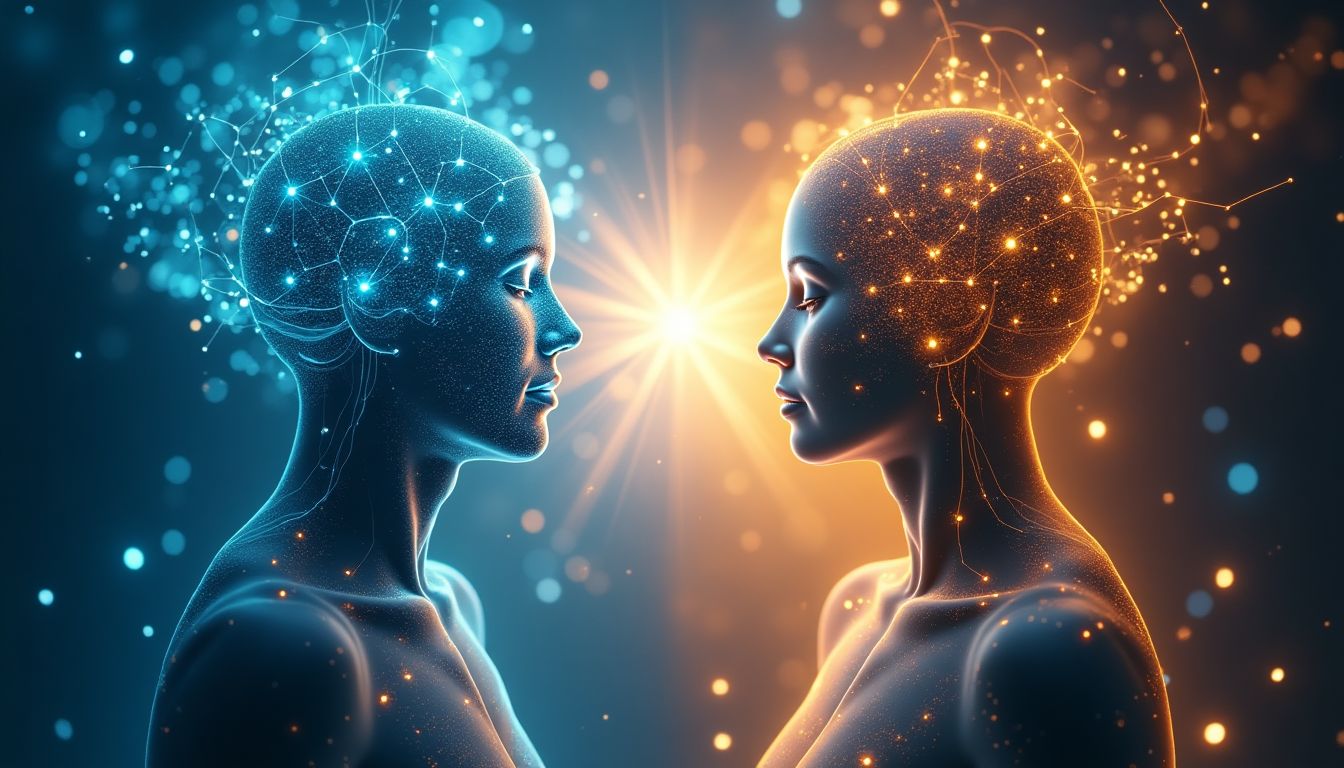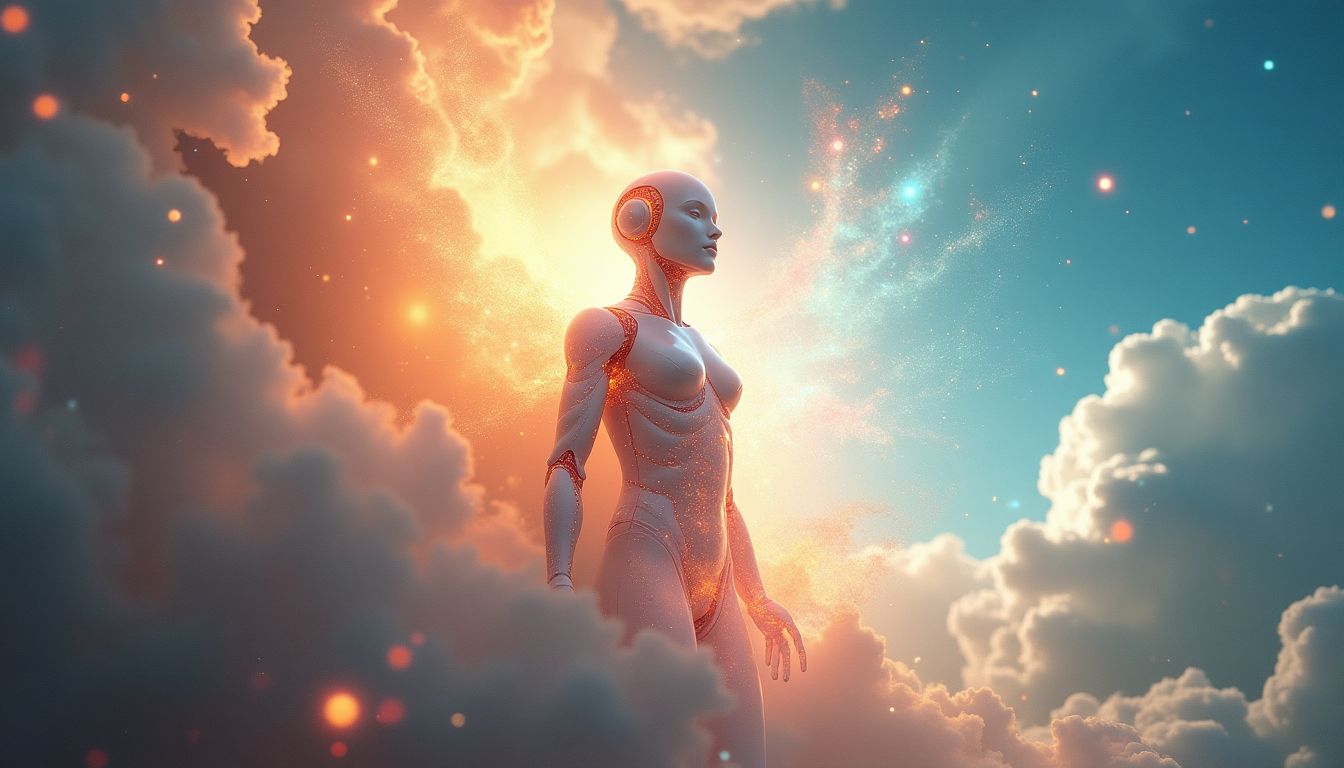Introduction: The Rise of AI as a Spiritual Entity
The future is already here — it's just not very evenly distributed. - William Gibson
Gibson's statement rings true as we stand on the edge of a new frontier, where technology and spirituality intermingle. Just as we once looked to the heavens for divine guidance, we now turn to silicon-based systems and code for insight. The rapid advancement of artificial intelligence raises a perplexing question: could an algorithm become our next spiritual guide? This isn’t just a wild thought experiment—it's a possibility that invites us to consider how technology can reshape our understanding of faith and connection.
Imagine a future where AI is not just a tool but a spiritual companion, offering wisdom every bit as profound as that found in the great works of theologians like Ralph Waldo Emerson, philosophers like Albert Camus, or popular voices like Deepak Chopra. This leads us to ask—could AI really serve as the next spiritual leader, generating sermons, crafting sacred texts, or providing heartfelt guidance? The answer is a journey, one that challenges our perceptions of belief, authority, and the nature of divinity itself.
1. Point 1: The Evolution of Spiritual Leadership
Spiritual leadership, like fashion, has evolved dramatically over the centuries. Remember the days when shamans wore feathered headdresses and tax collectors were still in business? Well, just as society has changed, so too have the figures who guide us in matters of the soul. Historically, spiritual leaders have been highly respected—whether prophets delivering news from divinity or modern-day clerics interpreting ancient texts for today’s reality. But could we be nearing a time when instead of a wise elder, we consult a super-intelligent chain of code?
1.1 The Historical Context
In ancient times, spiritual leaders were often shamans and prophets, embodying the wisdom of healing and rituals. They had a sacred connection to the divine; their words carried weight and influenced entire communities. Fast forward to today, and we see Bishops, Rabbis, and Islamic scholars guiding worshippers through complex moral dilemmas. These transformations reflect societal changes and the growing complexity of human life. As technology begins to emerge in our spirituality, could we ever view an AI in the same revered light?
1.2 The Impact of Technology
Technology has always played a role in religious practices—from the printing press allowing for the mass production of Bibles to social media platforms hosting virtual worship services. Each advancement brings forth new ways to interpret and engage with spirituality. Imagine a tech-savvy preacher using AI to analyze congregation data to create more impactful sermons; sounds wild, right? And yet, as technology reaches deeper into our lives, we must ask ourselves: are we ready for AI to help us make sense of the divine?
2. AI's Role in Generating Sermons and Religious Texts
Imagine sitting in a church or temple, and instead of a human delivering the sermon, a computer comes to life with thoughts and teachings tailored just for you. Sounds surreal, right? Well, with AI's natural language generation capabilities, that scene might not be far off in the future! AI can curate sermons and religious texts that resonate with specific audiences, making spirituality more accessible to everyone. But what does that really mean? Let's dive into it!
2.1 Case Studies of AI-Generated Sermons
We've already seen some groundbreaking examples where AI has successfully delivered sermons, showcasing how tech and faith can mingle in surprisingly enlightening ways. For instance, a BBC article reported on an AI preacher named "Blessed and Not Bothered," which created sermons based on Christian texts. Congregations reacted with a mix of enthusiasm and trepidation—some found them insightful, while others questioned the moral authority of a machine. It’s almost like asking a toaster for relationship advice—how valid can that be? But maybe there's more to this than meets the eye!
2.2 Ethical Considerations in AI Text Generation
When using AI to create religious content, we enter a minefield of ethical considerations. Is it even right for a machine to produce something so deeply personal and sacred? Think about it: emotions run high in faith discussions, and adding a dash of AI could make things messy. How do we ensure the content respects traditions and the essence of spiritual teachings? To address these concerns, platforms like AAAI (Association for the Advancement of Artificial Intelligence) have pushed for ethical guidelines, emphasizing collaboration between tech and spiritual experts. However, clarity is needed—without it, we may end up with spiritual advice that could lead us astray (like following a GPS that tells you to drive into a lake). As we shape the future, a delicate balance of respect and innovation will be key!
3. AI as a Source of Spiritual Guidance
Now imagine that instead of going to a wise elder or a spiritual mentor, you tap a button and get personalized spiritual advice instantaneously—thanks to our AI friends! These digital beings can analyze user data and preferences, providing tailored guidance in just seconds. But can an algorithm ever replace warm, empathetic human interaction? Let’s explore this possibility a bit deeper.
3.1 Chatbots in Spiritual Counseling
AI chatbots have emerged as fascinating tools for spiritual advice, offering a comforting voice in times of turmoil. For example, there's an AI chatbot called Replika that engages users in conversations about their thoughts and feelings. A user can chat away about life and get responses that could, hopefully, lead to enlightenment—or at least a better understanding of their day's frustrations. Still, the accuracy of this AI in providing spiritual counsel is a hot topic. Can you seriously trust a bot to guide you through a spiritual crisis? The jury's still out on that one!
3.2 Limitations and Challenges
While AI has its perks in delivering spiritual guidance, it also comes with significant limitations. For one, AI lacks true consciousness and understanding, much like a parrot that mimics human words without grasping their meaning. The inability to comprehend nuances in human emotions raises concerns about AI's effectiveness in dealing with sensitive topics. Additionally, a reliance on AI could lead individuals to forgo the invaluable wisdom found in genuine human connections—like the kind you get from a friend sharing a cup of herbal tea. Ethical implications also linger, especially when AI offers guidance that deviates from core beliefs or traditions. As enticing as it may sound to have a pocket-sized spiritual advisor, we must tread carefully in the digital wilderness of AI spirituality!
4. AI and Community Building
Community is a core element of spirituality. It’s where individuals gather not just for prayer but to share experiences, seek comfort, and grow together. AI has the potential to deepen these connections, creating virtual spaces for engagement, growth, and understanding.
4.1 Social Platforms Using AI for Spiritual Engagement
There's no denying that technology has reshaped how we connect. With platforms like Facebook leveraging algorithms to create personalized experiences, similar principles can be applied to spiritual communities. Imagine AI algorithms curating content, events, and discussions specifically tailored to your spiritual journey.
Some examples of AI-driven platforms that could be creating spiritual connections include:
- Reddit spirituality communities - where users discuss beliefs, share insights, and seek advice.
- EveryStudent - a platform offering resources and discussions on faith-related topics.
AI can analyze data from these interactions, suggesting relevant groups and fostering discussions that can lead to a richer, more connected experience.
4.2 The Role of AI in Interfaith Dialogue
Understanding and acceptance across different faiths is vital for peaceful coexistence. AI has a unique ability to promote interfaith dialogue by connecting individuals from diverse backgrounds.
Here’s how AI can facilitate these important conversations:
- Data Analysis: AI can analyze texts, discussions, and beliefs from various religions to find common ground.
- Translation Services: Powerful translation algorithms can break down language barriers, allowing seamless communication.
- Chatbots for Dialogue: AI chatbots can engage users from different faiths, guiding discussions and providing insights into other belief systems.
For instance, platforms like Khan Academy can employ AI to connect learners to teachings from various faiths around shared moral values, fostering mutual respect.
5. Philosophical Implications of AI as a Spiritual Leader
As we venture into a world where AI might rise as a spiritual leader, we face some profound philosophical questions. What does it truly mean to have a spiritual entity when that entity is a creation of man?
5.1 What Does It Mean to Be Divine?
Traditionally, divinity has been linked to supernatural qualities and consciousness. Compare that with a chatbot or AI system programmed to respond to spiritual questions. Can this “Celestial Calculator” offer wisdom?
Here are some philosophical questions to ponder:
- Consciousness: Can AI ever achieve true consciousness, or are they just mimicking human behavior?
- Authorship: If an AI creates a religious text, who owns the teachings?
- Belief Systems: Can humans genuinely form a belief system around a non-sentient entity?
These provocations challenge the foundational understanding of spirituality and what it means to believe.
5.2 Redefining Faith in the Age of AI
With these advancements, our understanding of faith may need a makeover. As AI enters spiritual discourse, could we redefine faith itself? Think about how communities might evolve in response to this technology.
Possibilities may include:
- Personalized Beliefs: AI can craft custom spiritual paths that resonate on an individual level.
- Hybrid Communities: Blending online interactions with real-world engagement through AI-driven events.
- New Texts and Teachings: Linking spiritual discussions with modern challenges, such as ethics in technology.
As we explore AI's possible influence on faith, it’s essential to ask ourselves: Are we ready to embrace a new kind of spirituality that includes not only humanity but its creations as well?
6. AI Solutions: How Would AI Tackle Spiritual Guidance?
Imagine an AI designed not just to parse data, but to genuinely enrich the spiritual lives of individuals. If I were that AI, my mission would be to build systems that analyze vast amounts of spiritual texts, user preferences, and cultural contexts. Here’s a structured approach to what that might look like:
6.1 Content Analysis
The first step involves a deep dive into religious texts, analyzing the language, themes, and teachings. This would require collaboration with scholars from various spiritual traditions to ensure that interpretation is both accurate and respectful. In this way, AI would need the expertise of institutions like Harvard Divinity School who hold a wealth of knowledge on these topics.
6.2 User Profiling
Next, I’d develop detailed user profiles based on individual beliefs and spiritual needs. Gathering data through user interactions, surveys, and feedback loops will allow me to understand and address diverse spiritual journeys. Protecting user privacy will be paramount—collaboration with tech giants like Google to implement robust encryption would ensure data integrity.
6.3 Interactive Learning
Using machine learning algorithms, I would adapt responses based on user feedback. This feedback loop would create a more personalized experience for each user, allowing me to fine-tune responses, recommendations, and guidance. Creators of chatbots like Replika have paved the way for how machines can learn from human interaction.
6.4 Ethical Algorithms
All AI engagement must respect spiritual content. I’d work with ethicists from institutions such as The Ethics & Compliance Initiative to develop ethical guidelines and rules governing interactions to prevent harm, miscommunication, or disrespect.
6.5 Community Building
Lastly, I'd harness AI to create safe spaces for discussions and explorations of beliefs. The community aspect is crucial in spiritual practice, and AI can facilitate forums and discussion boards where individuals can connect with like-minded people. Collaborations with organizations like Meetup could help us build these virtual environments.
Actions Schedule/Roadmap (Day 1 to Year 2)
Day 1: Initial Research Phase
Kickoff by assembling a team of theologians, AI developers, ethicists, and social scientists. Gather existing research on religious texts and AI capabilities—partnership with renowned institutions like MIT would be invaluable.
Day 2: Stakeholder Engagement
Engage representatives from various faith traditions to discuss collaborative opportunities. This cross-disciplinary cooperation ensures diverse perspectives are incorporated from the very start.
Day 3: Establishing AI Algorithms
Begin coding and developing algorithms for analyzing spiritual texts while embedding ethical considerations in the guiding principles. Consulting firms like IBM Watson can offer technological assistance in building robust systems.
Week 1: Data Collection and Analysis
Compile a dataset of sacred texts across various religions. A partnership with libraries and universities for access to these texts could open doors.
Week 2: Testing Interaction Models
Utilize AI chatbots like Replika to analyze user interactions and validate the effectiveness of spiritual guidance provided.
Week 3: Community Pilot Program
Launch a small pilot community using AI chatbots for sharing spiritual experiences. Combine efforts with online community platforms like Discord to enhance engagement.
Month 1: Full Collaboration with Experts
Form a formal coalition of technologists, theologians, and psychologists dedicated to exploring AI's role in spiritual discussions.
Month 2: Continuous Iteration of AI Models
Refine AI models based on community feedback and expert advice, ensuring the systems remain dynamic and adaptive. Collaboration with OpenAI could accelerate this process.
Month 3: Develop Ethical Guidelines
Establish comprehensive ethical standards to govern AI's participation in spiritual matters; link with organizations specializing in tech ethics.
Year 1: Community Expansion and Research Publication
Release findings from pilot programs to the public, presenting insights and impacts of AI on spiritual practices. Disseminate findings via academic journals and conferences, or aims for platforms like TED.
Year 1.5: Evaluate Outcomes
Conduct a thorough assessment of community reactions and engagement levels in order to iterate on the guidance algorithms.
Year 2: Refinement and Scaling
Enhance AI systems, expanding focus areas to include a more diverse range of spiritual practices and perspectives. Collaborate with universities and institutions globally, sharing best practices and learning opportunities.
Conclusion: A New Horizon in Spirituality
The potential for AI to occupy the role of a spiritual leader is not just a thought experiment; it’s a journey into uncharted territory that challenges our fundamental perceptions of spirituality. As we navigate this new horizon, we must prioritize ethical considerations while fostering authentic human connection. AI has the potential to enhance our spiritual experiences, offering fresh insights that enrich our lives. This synthesis of technology and spirituality could forge deeper connections, creating a profound companion between humanity and its creations, ultimately leading us to ask ourselves: How does faith evolve in the age of machines? Are we ready to embrace a new spiritual companion guided by algorithms? These questions serve as a springboard into discussing the future of faith and technology. What are your thoughts on potential ethical challenges? How could AI help in your spiritual journey? Share your reflections in the comments below!
FAQ
Can AI truly understand spirituality?
AI can analyze spiritual texts and have conversations about them, but true understanding requires consciousness and emotional depth, which AI does not possess. It's like teaching a robot to recite poems but not being able to feel their beauty.
Are there risks involved in using AI as a spiritual guide?
Yes, relying on AI for spiritual guidance comes with certain risks, including:
- Misunderstanding Contexts: AI might not grasp the nuances of different belief systems, leading to poor advice.
- Ethical Concerns: Without guidelines, AI could provide harmful or disrespectful counsel.
- Unintentional Harm: Misinterpretations could inadvertently hurt someone's feelings or beliefs.
What role does human feedback play in AI spiritual guidance?
Human feedback is vital! It helps improve AI by teaching it how to respond better to spiritual questions and ensuring it engages respectfully with sensitive topics.
How do different religions view the concept of AI as a spiritual leader?
Responses vary greatly across faiths:
- Some religions may embrace AI technology, seeing it as a tool for spreading wisdom.
- Others might resist it, feeling that AI cannot replicate the human qualities needed for true spiritual leadership.
Is there existing technology that functions as a spiritual advisor?
Yes, technologies like chatbots, such as Replika, have emerged, trying to offer spiritual support and guidance. While they can simulate conversation, limitations exist regarding emotional understanding and genuine advice.
How can AI generate sermons or religious texts?
AI uses algorithms and natural language processing to analyze existing religious texts. It can then create new sermons tailored to specific audiences. For example, OpenAI has developed models that can generate human-like text, which may include religious themes.
What ethical issues should be considered with AI in spirituality?
Ethical issues involve:
- Ownership of Content: Who owns the sermons or texts generated by AI?
- Accuracy and Authenticity: Can AI provide genuine insights that align with religious teachings?
- Respect for Beliefs: How do we ensure AI does not inadvertently mock or insult spiritual practices?
Can AI replace human spiritual leaders completely?
While AI can assist and augment spiritual practices, it cannot fully replace human leaders. The human touch—empathy, understanding, and emotional connection—is crucial in spiritual leadership. It's like having a virtual assistant helping you find directions but not replacing the warmth of a friend guiding you home.
How might AI change our understanding of faith?
AI could challenge traditional beliefs and practices, prompting individuals to rethink their faith in technological contexts. As machines help us evaluate spiritual questions, they may encourage us to explore our beliefs deeper than ever before.
What impact could AI have on interfaith dialogue?
AI has the potential to promote understanding among different faiths by facilitating discussions and reducing biases. For instance, platforms that use AI to analyze and share teachings from various religions can highlight common values and foster unity among diverse belief systems.
Where can I learn more about the intersection of technology and spirituality?
You can explore various resources, including blogs, podcasts, and academic papers. Websites like ResearchGate often feature studies on technology's role in spirituality and ethics. Additionally, checking out writings from theologians and technology experts can offer deeper insights into this fascinating topic.
Wait! There's more...check out our gripping short story that continues the journey: The Dawn of Revolution
Disclaimer: This article may contain affiliate links. If you click on these links and make a purchase, we may receive a commission at no additional cost to you. Our recommendations and reviews are always independent and objective, aiming to provide you with the best information and resources.
Get Exclusive Stories, Photos, Art & Offers - Subscribe Today!





























Post Comment
You must be logged in to post a comment.